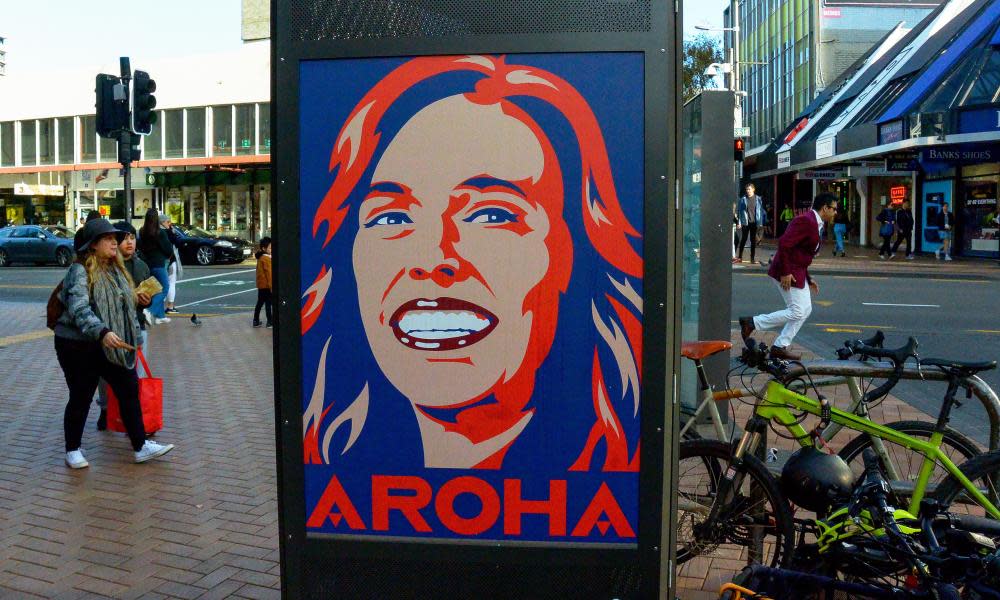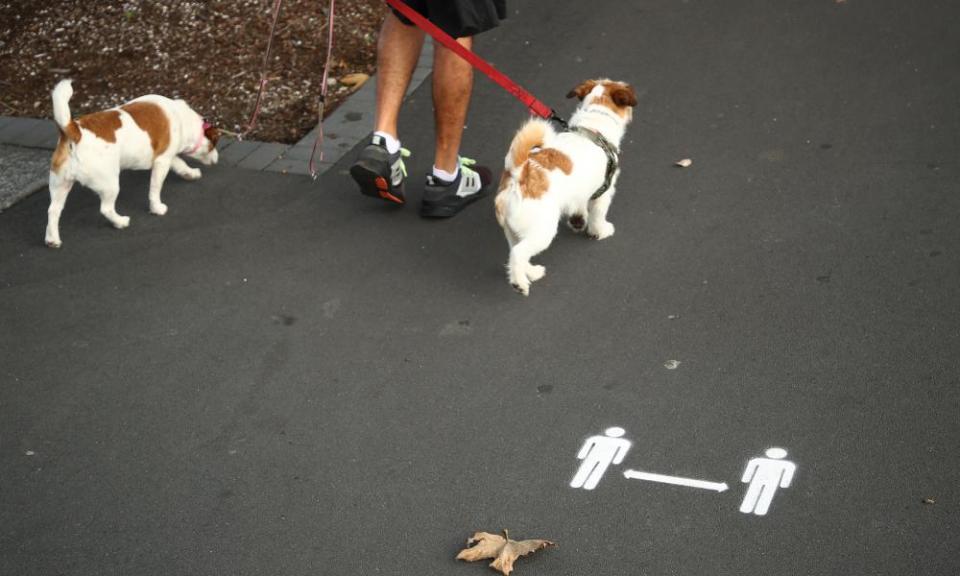New Zealand readers tell us how they want the country to change after Covid-19

Last week the Guardian asked New Zealanders how they thought the country should change as workers return to their offices and life slowly returns to “normal”. Many urged systemic and far-reaching changes in society following the pandemic, which saw just under 1,500 infections in the country and 22 deaths.
Overall, the majority of respondents were keen on exploring a four-day week – floated by the prime minister, Jacinda Ardern – saying it would allow for more work-life balance, and the continuation of habits picked up during lockdown, including home-cooked meals, walking, cycling and more time spent with the family. Other common suggestions included the introduction of a universal basic income, greater emphasis on climate change adaption – and fewer cars on the road.
‘There are more noble goals’
“I have been enjoying working from home. Working from home has meant I’ve seen my family more, have not had to spend an hour a day in the car commuting, and have been able to go on daily walks around the neighbourhood. Local walks have been wonderful, with next to no motorised traffic. Families have been out cycling on Auckland’s normally insanely dangerous roads. The city has been quiet. Birdsong has been audible. The air has been noticeably clearer.
Discretionary spending has dropped hugely. No more convenience shopping for lunches, no more Uber Eats. I’ve been cooking lunches and dinners, and enjoying it.
I wish the family time, the inner-city peacefulness, safety and cleanliness, and sense of community built by the crisis could continue.
Related: Like Christmas: New Zealand's post-Covid books boom
While we were in lockdown, it seemed as if the world would never be the same again. Now the economy is starting up again, it seems like we’re heading back towards a similar version of what we had before – except without international travel or tourism. I would like to see a fundamental change. I think neoliberal values have had their day, and that this crisis has proved, as has our government and the people’s response, that there are better priorities and more noble goals than the pursuit of growth above all else.”
Simon Bennett, 55, Auckland
I’ve really enjoyed not having to commute every day
Jade, Wellington
‘Four-day day week is a way forward’
“I have preferred working from home because my team live throughout the country and I communicate with them via video-call most of the time anyway. While I do miss small things like casual conversations with colleagues over a mug of tea in the office kitchen and getting dressed up to go out for the day, I have enjoyed other adjustments – such as our daily quiz now via Teams and being cozy in my dressing gown in the lounge at home as we head into winter here in the Southern hemisphere. The whole ‘work-life balance’ idea is so individual.
After Covid-19, I hope to continue spending greater time on activities that are so much more meaningful to me now, given our gradually less-limited freedom. While I was already a nature-lover and foodie, my passion for these areas of life has grown exponentially; my breath-work meditation practice, plant-based meals. The quality of my relationships is a constant work-in-progress but upon reflection, I wish to be more mindful of how I can engage in these more presently and attentively.

I think, where practically possible, [the four-day week] is definitely the way forward when it comes to the future of work. The global pandemic has forced several overdue ideas into action, like virtual healthcare consultations and more flexible working arrangements. This opportunity has a lot of potential, from stronger family connections and social cohesion to business productivity and employee health outcomes. We need to be open to new ways of doing things, especially when it revolves around one of the world’s precious non-renewable resources – time!”
Sarsha Sivanantham, 22, Wellington
‘Why would I want to go back into the office?,
“Working from home can bring so many bonuses – flexibility, pleasant working environment, no early morning alarms, no stressful commuting, enjoying daily lunchtime walks, better home-prepared meals, better quality sleeping and less anxiety. Why would I want to go back into the office?”
Rachael, 57, librarian, Wellington
‘We need to refocus on the environment’
“I’ve worked from home for years, as a copywriter and now as a researcher. I prefer it and think most people should be allowed to do it. I hope when I finish my program this year I’ll land a job that will allow me to continue to work from home. The fact that most people still go into a brick-and-mortar office in this day and age is bizarre. The environmental impact alone should be a reason to change this. Why so many are forced to get in their car, drive 30+ minutes to an office, and sit at a desk to answer emails is beyond me.
It would be awesome if New Zealand could find a way to move forward with less dependence on tourism. Tourism was wreaking havoc on the environment and only really helping the ‘bottom line’ on economists’ spreadsheets. There’s gotta be a better way to transfer those jobs and businesses to something less dependent on people getting on a plane for 12 hours to come here. I suggest re-focusing all that manpower towards environmental projects, business innovation, and sustainability.”
April, 41, Wellington
‘The world cannot carry on in the exhausting way we have been’
“Less Facetime and more face-to-face time with the people that matter is what it’s all about, right? Many New Zealanders it seems are increasing our veggie patches and our ability to take care of ourselves in the event of another emergency like this one. The world cannot carry on in the exhausting way we have been and that includes exhausting our finite resources and upsetting the earth’s ability to deliver on the renewable ones like clean air and water. Humans don’t need to take it all.”
Evie Ashton, 48, Auckland
‘Halt global heating’
“I’d like to see a universal basic income, a return to more progressive taxation and more emphasis on halting global heating.”
Malcolm, 70, Lower-Hutt
‘I can actually breathe’
“I have absolutely loved the working from home it’s been an incredible opportunity and privilege that I never thought I would have. I’ve really enjoyed not having to commute every day … having the ability to hang out the washing and walk the dog in the morning is an added benefit. I feel like I can actually breathe and my heart isn’t always racing.”
Jade, 43, Wellington
‘I will miss the birdsong’
“I loved working from home, but I would like to see colleagues in person occasionally, as I found Zoom meetings tiring after a while. My perfect arrangement would be days when we have the option to work from home, and agreed mornings or afternoons when we are at work and can see people in person.
I am going to miss the quiet streets, empty skies and more audible bird song – that was the silver lining during our lockdown.”
Nicki Frances, Lower Hutt, early 50s
‘Rely on the outside world less’
“I believe New Zealand needs to look at how it can look after itself more when this happens again. I don’t think New Zealand should give up on globalism but I do think we should rely on the outside world less.”
Nicola, Auckland

‘Unrelenting greyness of the office’
“I would love to be able to retain the silence and the birdsong. The impact of traffic noise has been shown to be all-pervasive harm to our peace and connection to nature. Electric cars and bikes are far quieter – I would like to see a definite and fixed timetable for the phase-out of all combustion engines.
I’ve loved being able to enjoy the sunshine all day long, while working from home.
When I stop for a coffee, I can go sit in the sun, or go potter outside amongst the plants. When I think of going back to the office, all I see in my mind is the unrelenting greyness of shadowy office space. I no longer want to spend the best part of every day sitting in the gloom.
But most of all, working from home has made me realise how stressful my work is, and how much I dread the everyday office conflict, hierarchy, surveillance and ‘constructive criticism’. Work has given me my best friends, meaningful work, and an educated understanding of the world. But it’s also utterly reductive, demoralising, and humiliating. I am one of the lucky ones, with a salaried, permanent job, and yet it feels actually like an abusive relationship. Lockdown has made me realise more than ever I need to get out, and find some other way to earn a living – independent, creative, and with my self-respect in one piece.”
Anonymous, Wellington, 48
‘I love people’
“I love people so I want to be able to carry on just like before.”
Leif, Auckland, 82
‘This pandemic is a portal’
“As the wonderful Arundhati Roy wrote shortly after the Covid-19 pandemic had been declared, this pandemic is a portal. We can step through to work towards a world focused on human and planetary health, happiness and wellbeing, or we can try to ‘get back to normal’ – which means continuing the unsustainable economic rat race that has been driving us into a spiralling vortex of problems. I’m for going through the portal.
The first thing we need to do is change our mindsets – we’ve become an urbanised consumer society – and we’d do well to listen to the voices of our first people who work so hard to teach us kaitiakitanga (guardianship and protection), a way of managing the environment, based on the Māori world view.”
Anne, South Island
‘Not the same dynamic’
“In terms of work-life I’m quite pleased to go back to the office, I really enjoy the team I work with and working from home doesn’t give the same team dynamic that I’m used to. I also really enjoy the separation between home and work life which just isn’t possible where I currently live.”
Anonymous, 28, Wellington
‘Community values’
“It seems the silver lining in NZ has been a reinforcement of some core community values which may have been lost over the last few decades. That may be a bit of a generalisation but I’ve noticed more care and consideration in my own neighbourhood over this time.”
Tim, 49, Lower Hutt
‘No return to business as usual’
“Ultimately Covid is another expression of climate change. As is the severe drought we are still experiencing. I am not an advocate for going back to business as usual. Shelter, food and interesting culture are more important.”
Anonymous, Hokianga
‘Chronic problems exposed’
“The biggest changes I hope to see are not in my home but in society at large, where Covid-19 has thrown some chronic problems into stark relief. We could try to get back to how things were, but why, when we know how dysfunctional it was?”
Ben Whitmore, Raglan, 43
‘Greater appreciation of time’
“I would hope to see a new ‘normal’, one where people appreciate their time more and working from home is a real possibility. It seems as if many people gained a greater appreciation for their time, health, and nature during the lockdown, and it would be a shame if this was lost so quickly and without serious consideration for what life could be like.”
Edward, 29, Auckland


